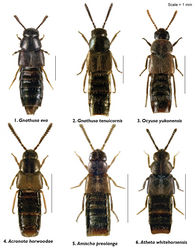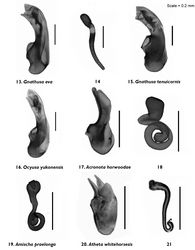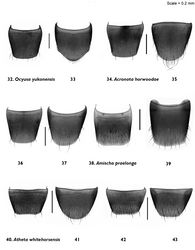Difference between revisions of "Ocyusa yukonensis"
m (Imported from ZooKeys) |
m (1 revision) |
(No difference)
| |
Latest revision as of 09:44, 26 April 2012
| Notice: | This page is derived from the original publication listed below, whose author(s) should always be credited. Further contributors may edit and improve the content of this page and, consequently, need to be credited as well (see page history). Any assessment of factual correctness requires a careful review of the original article as well as of subsequent contributions.
If you are uncertain whether your planned contribution is correct or not, we suggest that you use the associated discussion page instead of editing the page directly. This page should be cited as follows (rationale):
Citation formats to copy and paste
BibTeX: @article{Klimaszewski2012ZooKeys186, RIS/ Endnote: TY - JOUR Wikipedia/ Citizendium: <ref name="Klimaszewski2012ZooKeys186">{{Citation See also the citation download page at the journal. |
Ordo: Coleoptera
Familia: Staphylinidae
Genus: Ocyusa
Name
Ocyusa yukonensis Klimaszewski & Godin sp. n. – Wikispecies link – ZooBank link – Pensoft Profile
Holotype
(male). Canada, Yukon, EMAN Plot (Ecological Monitoring and Assessment Network), mature white spruce and feathermoss forest, 60.5963, -134.9522, 8.VII.2003, 738 m, yellow pitfall trap (LMKM31Y), (LFC).
Paratype
Yukon, EMAN Plot, 60.5963, -134.9522, 24.VII.2003, 738 m, black pitfall trap (LMKM31B), (ECW) 1 male.
Etymology
Yukonensis - a Latin adjective derived from the Yukon Territory, Canada.
Diagnosis
Body small, subparallel, robust, uniformly dark brown, almost black; length 2.8–3.0 mm; head round in outline and almost as wide as pronotum; antennae with article 4 subquadrate, 5–10 moderately transverse, increasingly wider apicad; pronotum transverse, angular posteriad and slightly narrower than maximum width of elytra; abdomen subparallel, at base as wide as elytra (Fig. 3). MALE: male tergite 8 widely truncate apically (Fig. 32); sternite 8 slightly produced at apex (Fig. 33); median lobe of aedeagus as illustrated (Fig. 16). FEMALE: unknown.
Distribution
This native Nearctic species is known only from the type locality in the Yukon.
Bionomics
Two adults were collected in July.
Original Description
- Klimaszewski, J; Godin, B; Bourdon, C; 2012: Further contributions to the aleocharine fauna of the Yukon Territory, Canada (Coleoptera, Staphylinidae) ZooKeys, 186: 207-237. doi
Images
|


